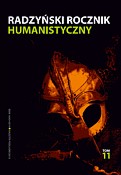 RADZYŃSKI
ROCZNIK HUMANISTYCZNY
RADZYŃSKI
ROCZNIK HUMANISTYCZNYtom 11/2013
Janusz Frykowski
Streszczenie
Reaktywacja parafii ruskiej w Żernikach w drugiej połowie XVII wieku
W referacie opisane są okoliczności reaktywowania parafii ruskiej w Żernikach pod koniec XVII wieku. Żerniki badanego okresu były wsią połozona w powiecie bełskim, na terenach objętych granicami dwóch kościelnych jednostek różnych wyznań: eparchii prawosławnej (od 1596 r. unickiej) oraz diecezji rzymskokatolickiej.
Pierwsza wzmianka o drewnianej cerkwi w Żernikach znajduje się w rejestrze poborowym z 1562 r, Kolejna informacja źródłowa z 1573 r. I pokazuje parafię w stanie upadku. W kolejnych źródłach podatkowych, aż do 1662 r. ani świątynia, ani pop w Żernikach nie widnieją.
Parafię ruską w Żernikach reaktywował 14 listopada 1694 r, jeden z właścicieli wsi Paweł Zbychalski z żoną Krystyną. Fundator ze swoich włości wydzielił grunt pod budowę przyszłej świątyni i nadał uposażenie kapłanowi. Zwiększenie uposażenia parocha w kolejnych latach nastąpiło za sprawą darowizn dokonanych przez kolejnych właścicieli wsi Jana Żulińskiego oraz Stanisław Józefa Ochockiego i Franciszka Dąbrowy.
Summary
The revival of the Ruthenian parish in Żerniki in the latter part of the 17th century
The article describes the circumstances of the revival of the Ruthenian parish in Żerniki at the end of the 17th century. In the studied period Żerniki was the village located in Bełż district, on the territory between the boundaries of two different religions: the Russian Orthodox eparchy (from 1596 - Uniate) and the Roman Catholic diocese. The first reference to the wooden tserkov in Żerniki appears in the register of conscripts of 1562. Yet another source of information from 1573 depicts the parish in a state of ruin. In the next tax sources, up to 1662, neither the tserkov nor the Orthodox priest appears. The Parish in Żerniki was revived on 14 November 1694 by one of the village owners, Paweł Zbychalski, together with his wife Krystyna. The founder allotted land from his own property as the site for the construction of the new church, and he granted a living to the Orthodox priest. The increase in the priest's income in the upcoming years was made via the donations made by the successive village owners, i.e. Jan Żuliński, Stanisław Józef Ochocki, and Franciszek Dąbrowa.